The Rise of Digital Trust
For as long as humans have traded, we’ve relied on trust — enforced by reputation, law, or third parties. Every business, no matter the industry, ultimately depends on agreements: contracts that define who does what, when, and for how much.
Now imagine those agreements executing themselves.
That’s the core idea behind smart contracts — digital agreements written as code, designed to automatically enforce terms without intermediaries. They don’t need signatures, clerks, or bankers. Once triggered, they simply… run.
If that sounds revolutionary, it’s because it is. Smart contracts are one of Web3’s most powerful innovations, forming the foundation of decentralized finance (DeFi), NFTs, DAOs, and other blockchain-based systems. But their potential extends far beyond crypto — into nearly every industry that depends on reliable, repeatable agreements.
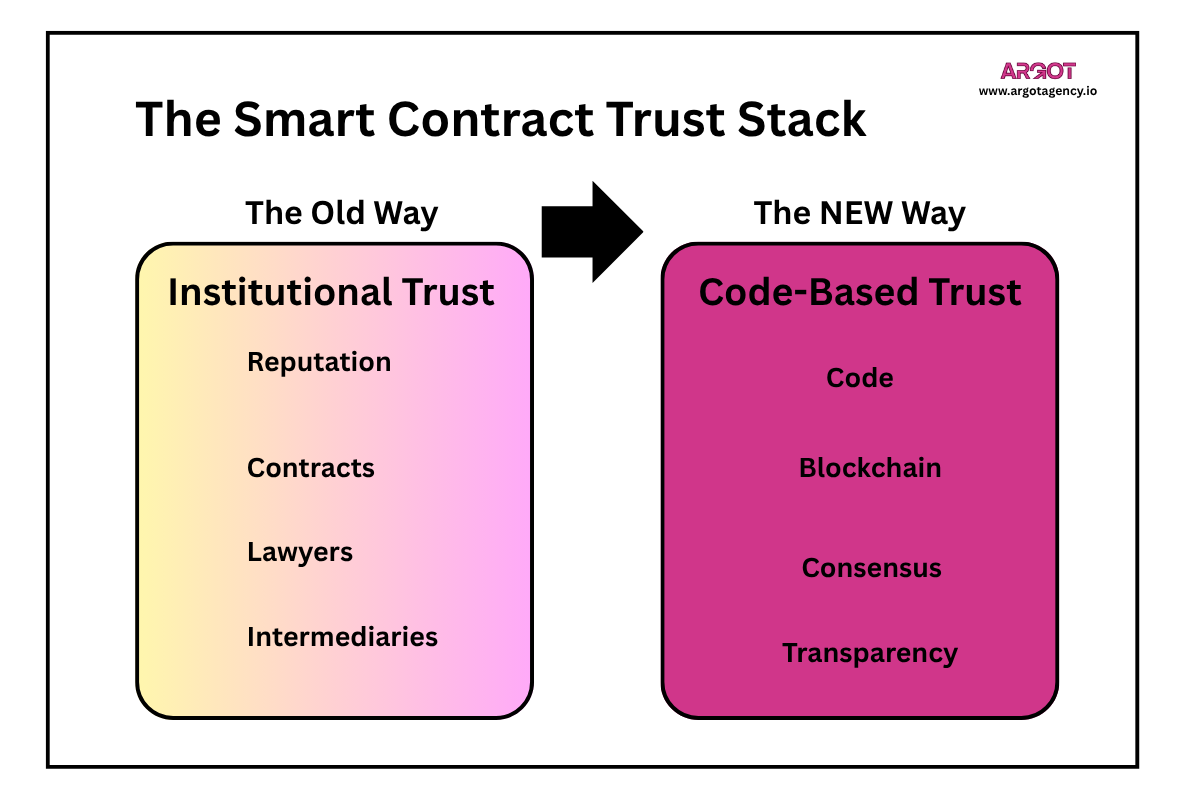
What Is a Smart Contract?
At its simplest, a smart contract is a self-executing agreement between parties, where the terms are written directly into code and stored on a blockchain.
When certain conditions are met, the code runs automatically. No paperwork. No middleman. No waiting for approvals.
A smart contract acts like a vending machine:
- You insert a coin (the input),
- The machine checks it’s valid (the condition),
- And it releases your drink (the outcome).
That’s the entire transaction — no cashier required.
On a blockchain, the “machine” is digital and distributed, but the logic is the same. Code replaces human enforcement.
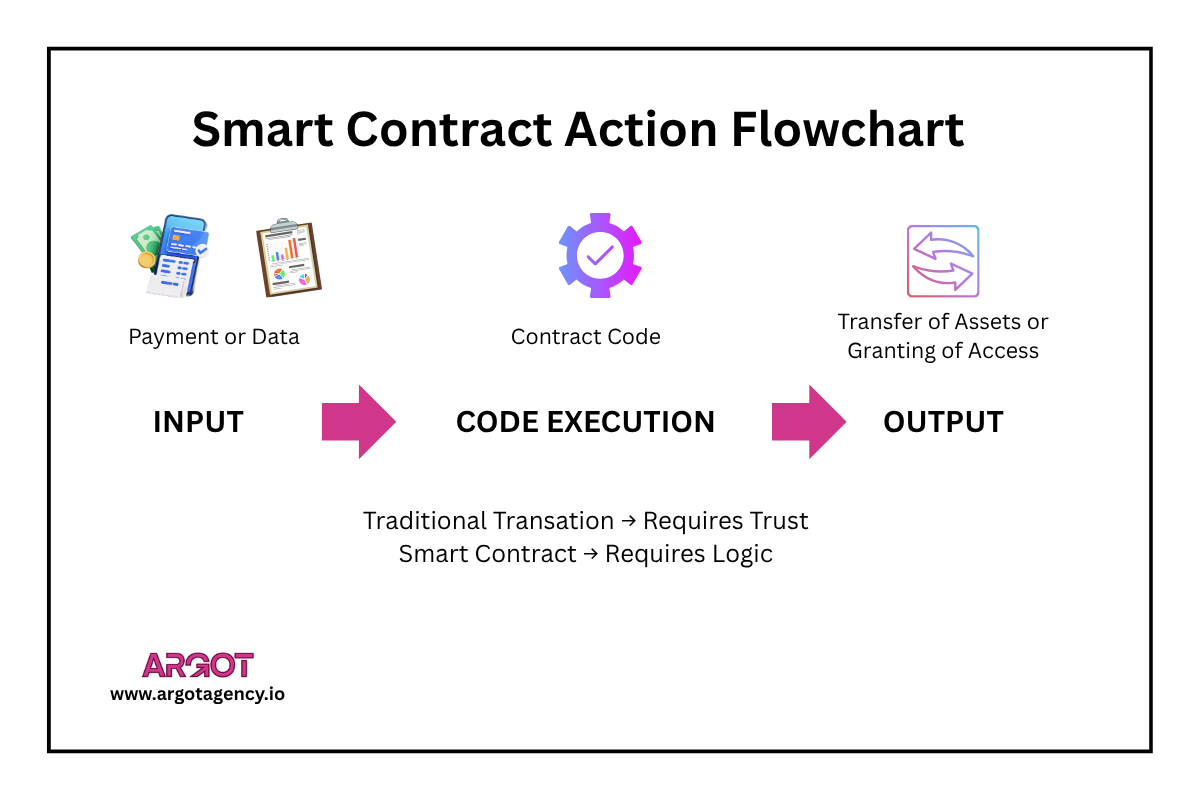
How Smart Contracts Work (Without the Jargon)
A smart contract has three key parts:
- Conditions — the “if” statements that define what triggers execution (e.g., “if payment received…”).
- Actions — what happens when those conditions are met (e.g., “…then transfer ownership of asset”).
- Verification — blockchain nodes verify execution, ensuring transparency and immutability.
Because they run on blockchain infrastructure:
- The code and results are publicly verifiable.
- Once deployed, the code cannot be altered without consensus.
- Transactions execute automatically, 24/7, anywhere in the world.
In other words, smart contracts replace traditional trust models with mathematical certainty.
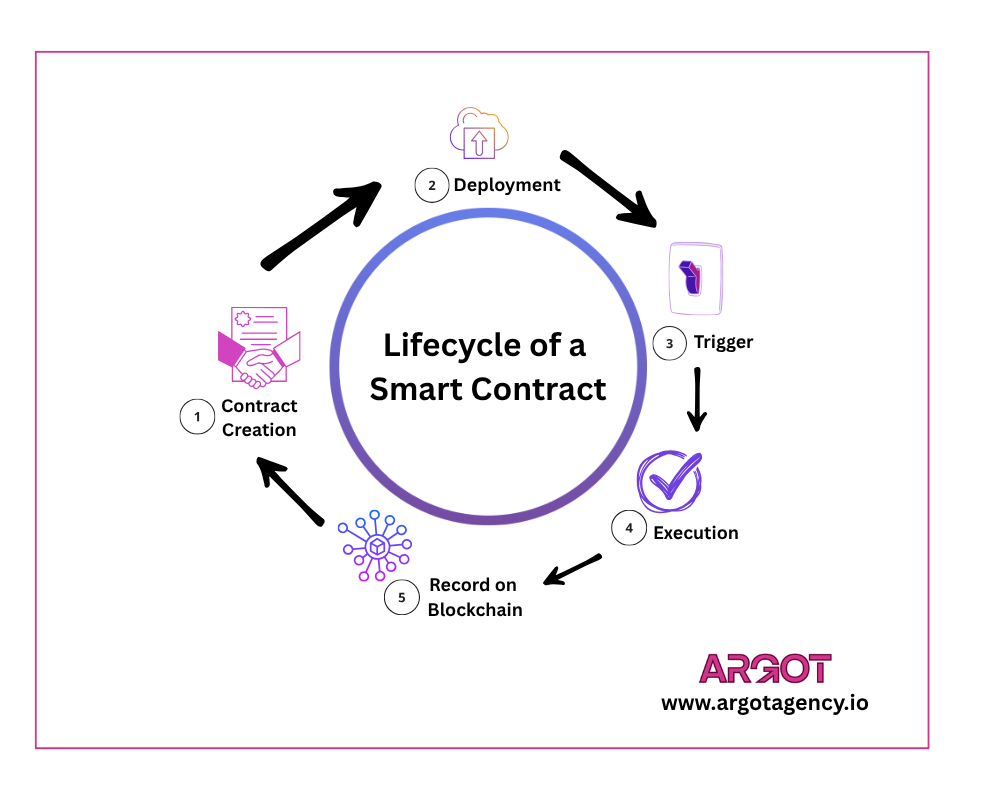
Business Use Cases That Matter
Smart contracts are no longer theoretical. They’re already transforming how businesses handle transactions, logistics, and customer engagement.
Finance
Smart contracts enable instant, automated financial transactions — from escrow releases to loan repayments. DeFi protocols use them to remove banks entirely from the equation, executing trades and lending with no human intermediaries.
Supply Chain & Logistics
A smart contract can trigger payments when a shipment’s arrival is verified by a sensor or blockchain record, reducing delays and fraud.
Real Estate
Platforms like Propy have already demonstrated how property sales can occur entirely on-chain — funds, ownership, and documentation handled by code.
Legal & Compliance
Contracts can encode compliance logic — automatically blocking actions that violate predefined rules, while providing a transparent audit trail.
Marketing & Loyalty
Brands can issue NFTs or tokens representing membership tiers, automatically distributing rewards or unlocking experiences when customers meet set milestones.
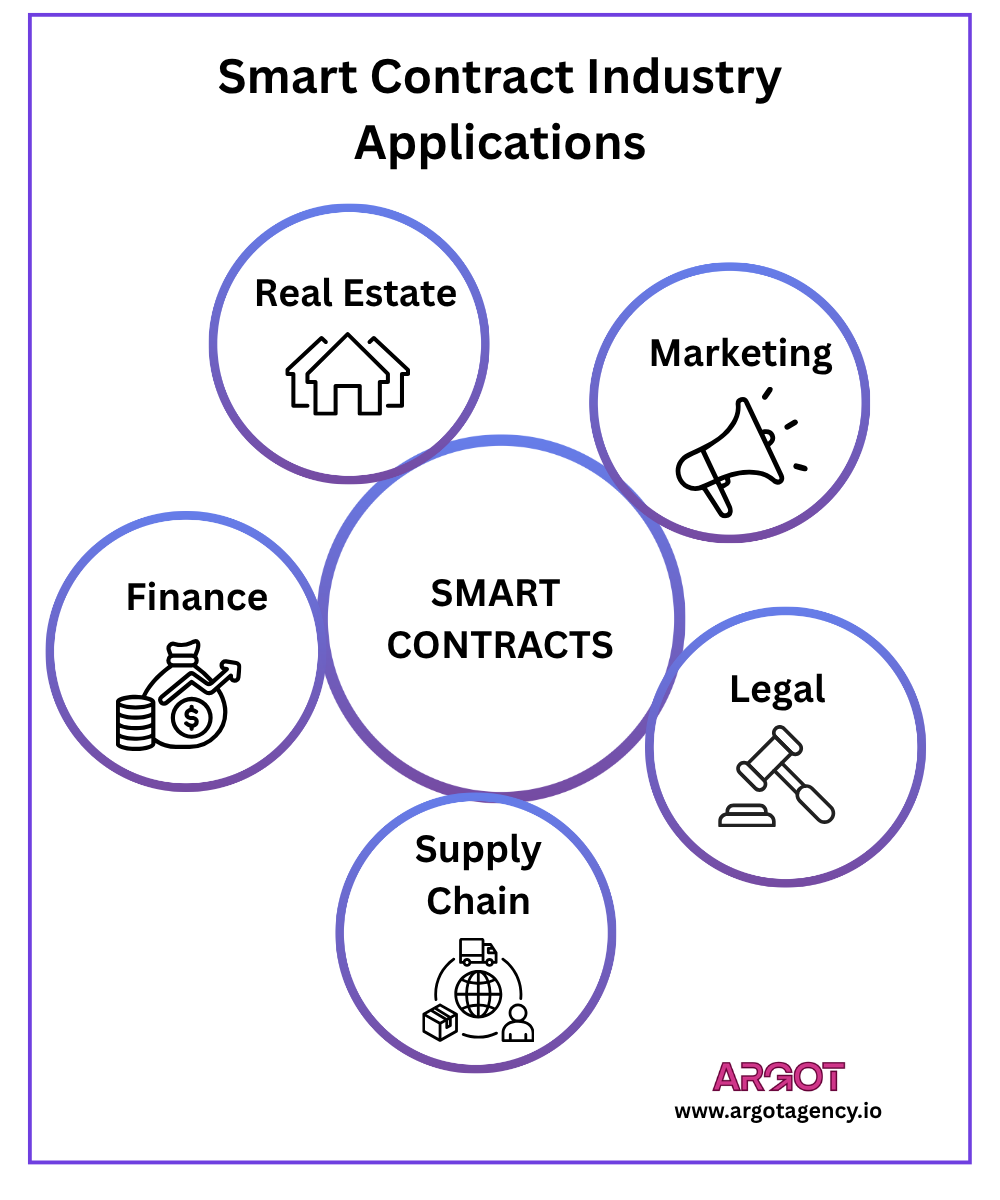
Benefits for Businesses
The appeal isn’t just about novelty — it’s about economics, efficiency, and competitive advantage.
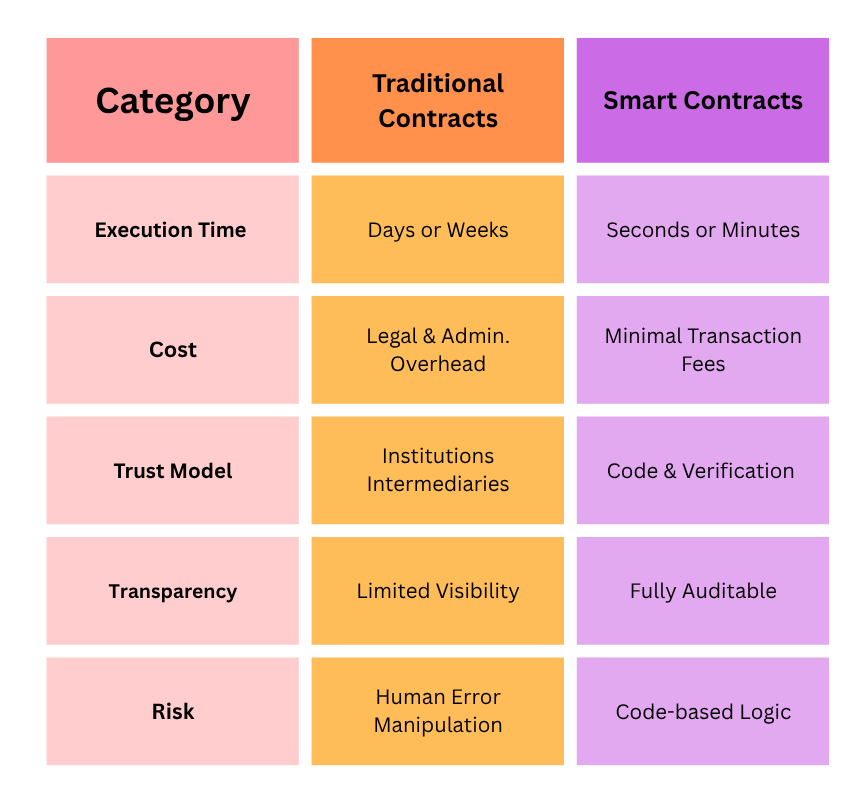
Limitations and Challenges
Smart contracts are powerful, but not infallible. Business leaders should understand their limits before implementation.
- Code is law — literally.
A bug in a contract can lead to unintended outcomes (and costly ones). Once deployed, a flawed contract can’t be easily undone. - Data accuracy (“oracle problem”).
Contracts rely on outside data to trigger actions. If that data is wrong — for example, an incorrect weather report or shipping record — the results can misfire.
Solutions like Chainlink and other oracle networks are working to solve this. - Legal gray areas.
Most jurisdictions don’t yet have clear frameworks for how smart contracts interact with traditional law. Hybrid “code + clause” models are emerging to bridge that gap. - Technical barriers.
Writing and auditing smart contracts requires skilled developers and specialized knowledge.
Real-World Examples
AXA’s Flight Delay Insurance
AXA launched an experimental product called Fizzy using Ethereum smart contracts to automatically pay travelers if their flights were delayed. No claims, no phone calls — the data triggered the payout.
Propy
Real estate platform that uses smart contracts to facilitate property sales. Funds are held in escrow on-chain and automatically released once ownership transfer conditions are met.
Uniswap
A decentralized exchange that uses smart contracts to swap tokens automatically — removing brokers entirely.
Chainlink
A decentralized oracle network that connects real-world data (like prices or events) to smart contracts, ensuring accuracy and reliability.
How Businesses Can Begin to Experiment
If you’re running a Web2 or traditional company, smart contracts might sound futuristic — but you don’t need to leap into full automation overnight. Start small and learn by doing.
1. Identify low-risk, high-volume tasks.
Look for repetitive, rules-based processes that depend on trust or verification — payments, reward programs, or service confirmations.
2. Collaborate with a Web3 consultant or development partner.
A knowledgeable firm (like Argot) can help scope, audit, and deploy test contracts safely.
3. Start with hybrid models.
Use smart contracts alongside traditional agreements. For example, an NFT-based membership or automated payment clause while maintaining standard legal contracts.
4. Pilot a proof-of-concept.
Even small tests — like a loyalty reward drop or automated subscription renewal — can provide valuable insight into efficiency gains and customer reactions.
5. Monitor, measure, and iterate.
Track execution accuracy, cost savings, and user engagement. Smart contract projects should evolve like software — continuously improved over time.
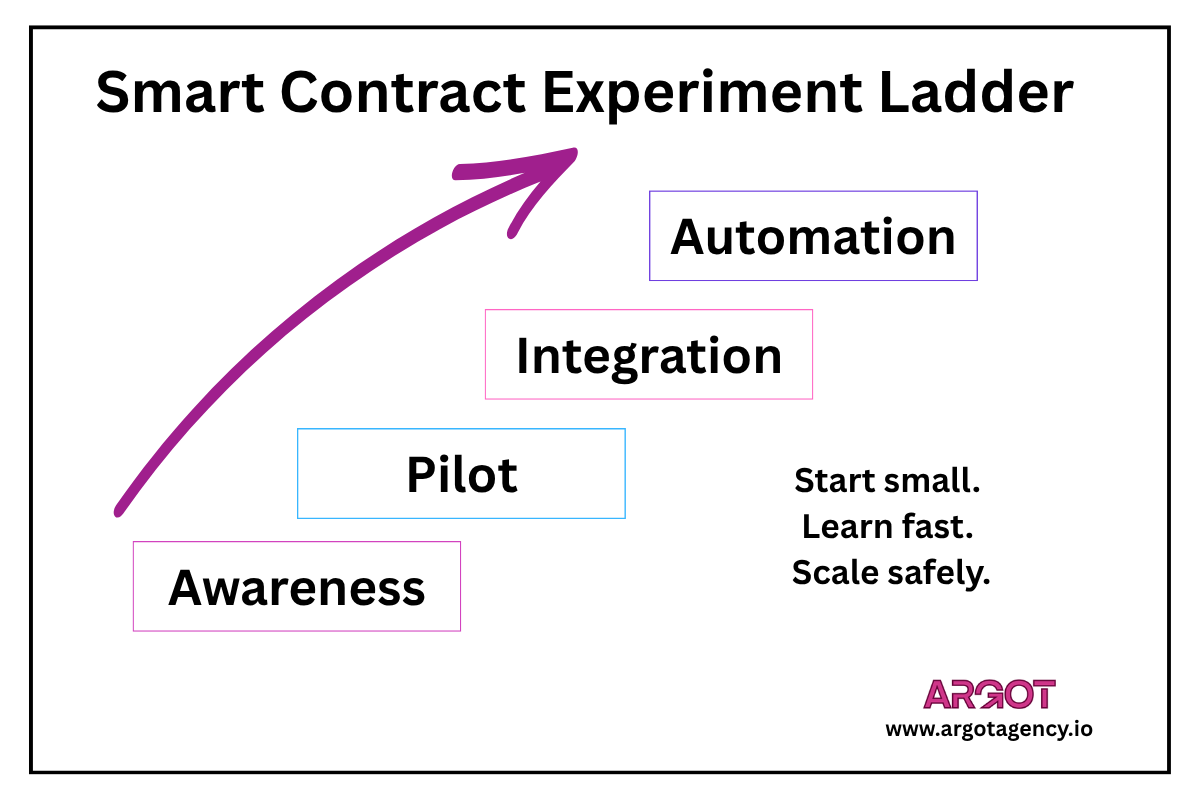
The Future of Agreements
Smart contracts are more than a technological upgrade — they represent a philosophical one. They allow businesses to move from trusting people to trusting systems — reducing friction, increasing transparency, and enabling collaboration at scale.
In the coming years, we’ll likely see hybrid contracts combining legal text with blockchain logic, enforced both by law and code. As AI and IoT systems integrate with smart contracts, “autonomous organizations” may become real — digital entities that operate, transact, and grow entirely through code.
The question isn’t whether smart contracts will matter — it’s when your business will start using them.
Conclusion — A Smarter Way to Do Business
Every industry that depends on agreements stands to gain. Whether you’re in finance, supply chain, law, real estate, or brand strategy, smart contracts are worth understanding now — before they become the default.
At Argot, we help businesses translate Web3 concepts into actionable strategies — designing pilot programs, evaluating risks, and identifying scalable opportunities.
→ Learn more about our Web3 consulting services at www.argotagevcy.io



